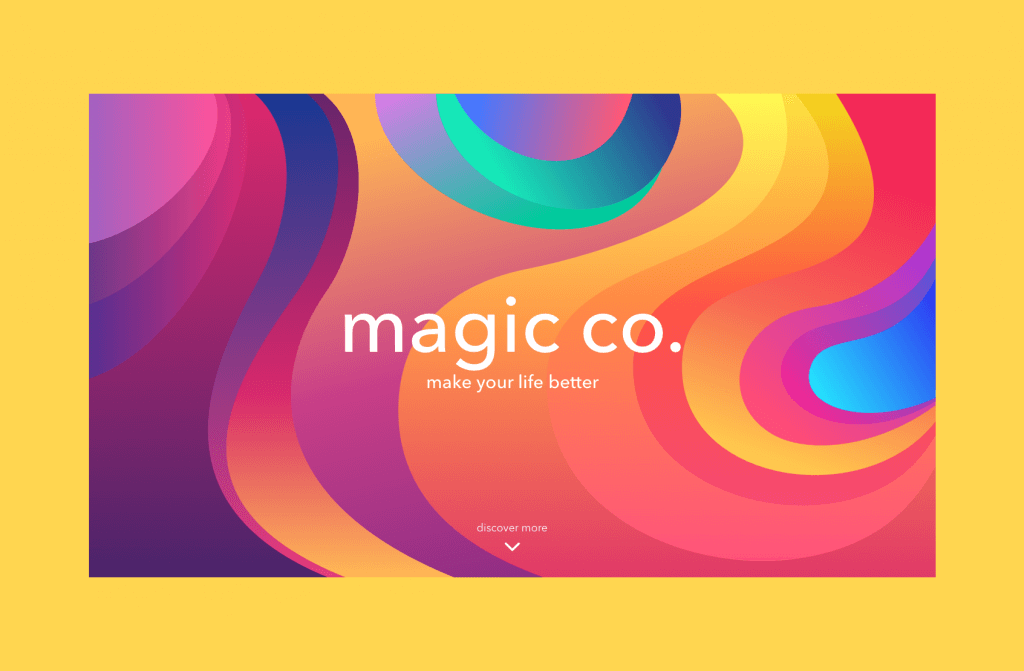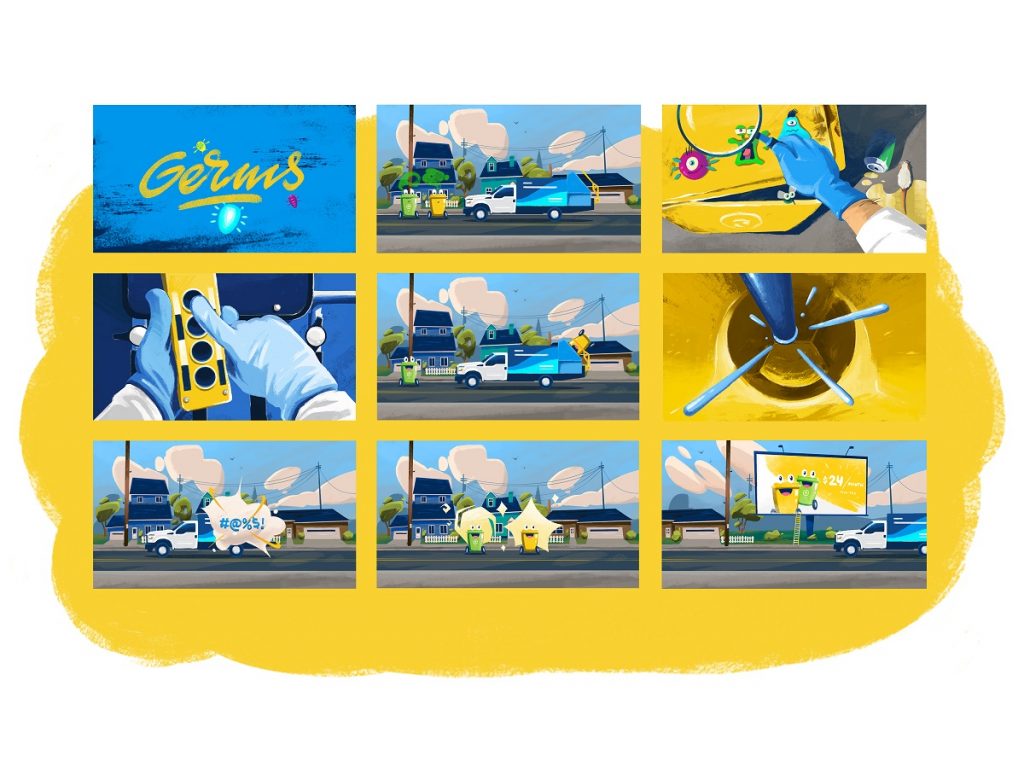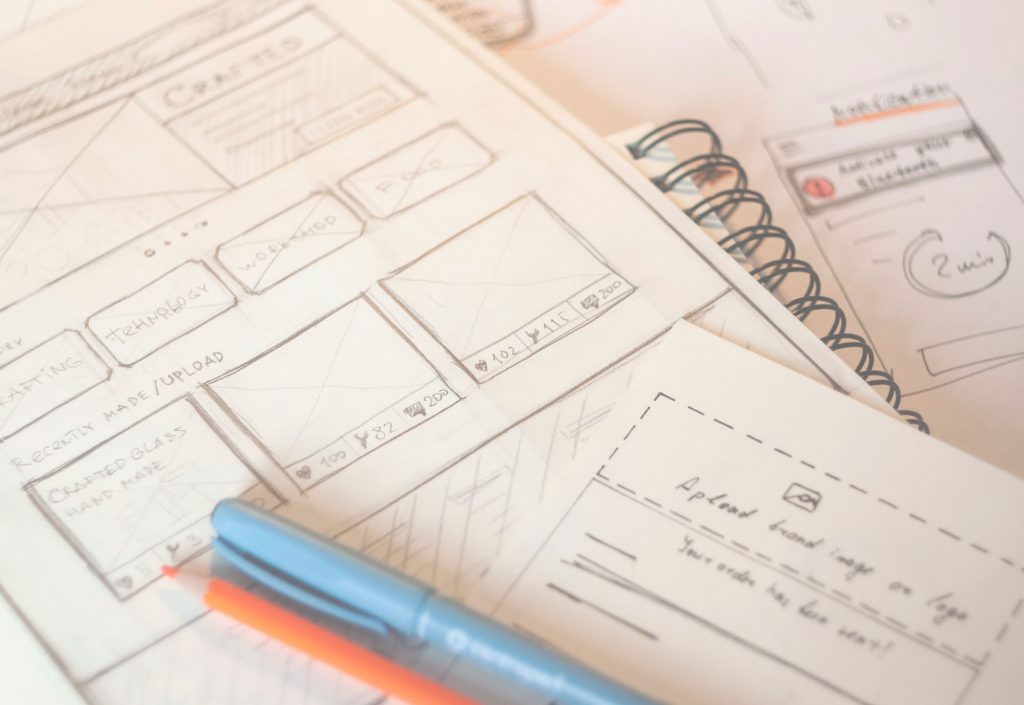This issue of our Design FAQ Platform is going to be devoted to only one question, which requires serious consideration. We have received it from our colleague – UI/UX designer Kenil Bhavsar and we were glad to get together to grasp a bunch of ideas from all Tubik UI/UX designers on this actual and deep topic. So, let’s get started. The question is: What is an ideal process of UX / UI to make the product viral into the world? We usually avoid talking about anything ideal as it is rather a contradictory category; however, we are keen to share our ideas about making products viral on the stage of UX/UI.
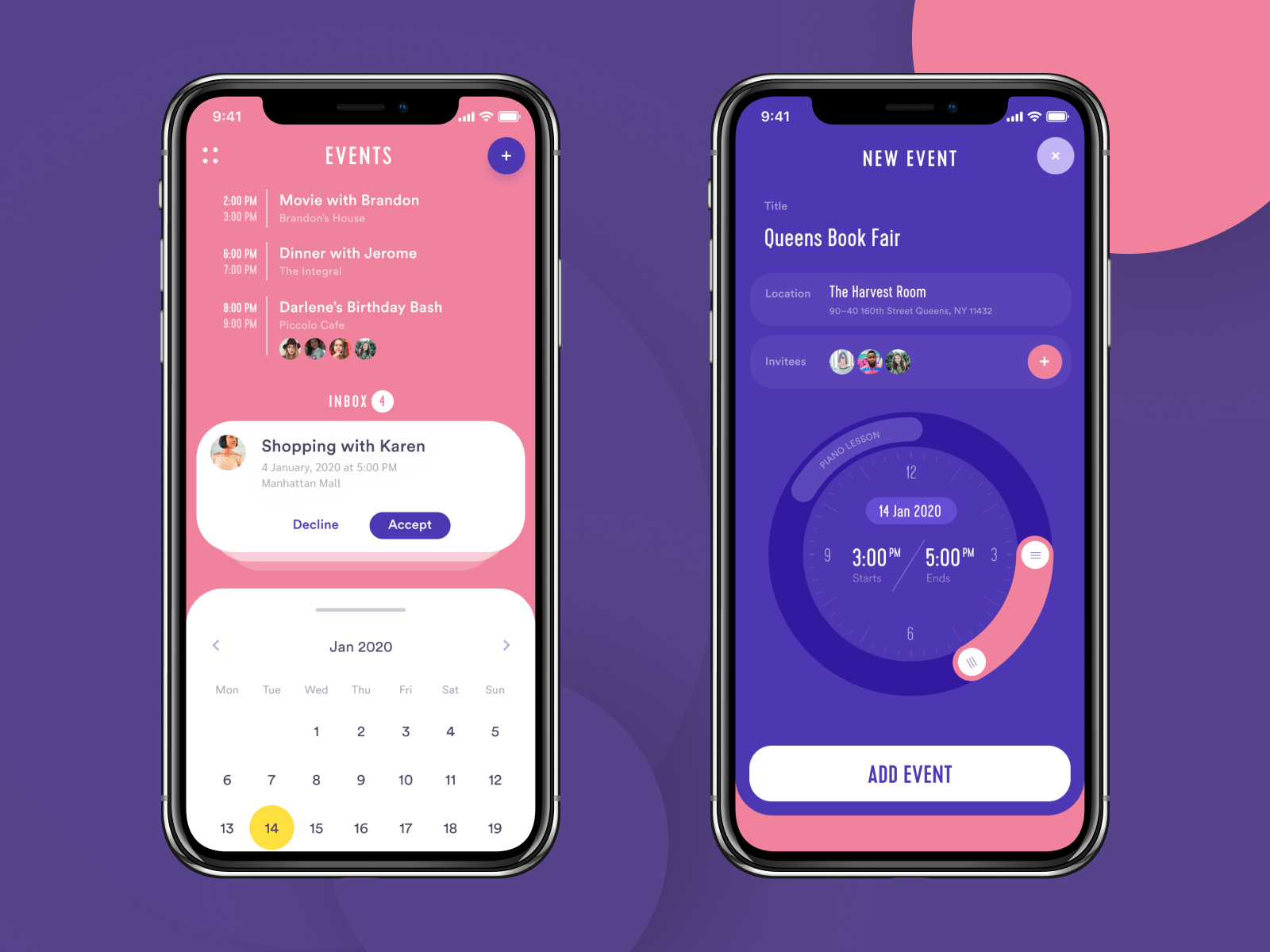
Event app design
The essence of virality
Virality is the concept behind which we understand fast and easy self-promotion of the product among users. Like a kind of infectious disease, it spreads from one person to another, and no special efforts are needed to support this process. Organic growth of this sort of product is coming from recommendations and sharing. Making the product viral is the dream of any customer who sets it on the market and, therefore, any designer who is keen to create something successful and widely known.
Initially and traditionally, production of this “gene of virality” and “infecting” the product with it was entrusted to marketing specialists and advertisers. They analyze the target audience, research the market and develop the strategy according to which they directly or indirectly stimulate the users to share the product and create a solid presence in the market. In the sphere of promotion, it is a well-known law that the best advertising is word-of-mouth, one that is based on personal recommendations. The strategy and means of making the product viral can be thought out and agreed upon not only when the product is created but also much earlier, in the stages of its physical or even conceptual creation.
Nevertheless, now virality goes far beyond the marketing process, especially when it comes to web and app design products. Practice shows that there are some things to consider and some mechanisms to apply in the process of UX/UI design in order to make the product more or less viral, which means promoted by users and therefore saving time, money, and effort on marketing.
Pre-design stage
Any designer knows that predesign stage is as important as the time for actual work on design creation. Design should be based on solving problems and giving positive experiences, so it’s not only a visual but also a psychological thing. This stage is vital for any kind of product, but if you have the aim to make your product viral, it requires even more attention and deeper analysis. So, here is a list of some things to consider at this stage in the aspect of the potential virality of the product.
1. Find the key features and start with them
The mistake of some products which haven’t become really successful and widespread is the attempt to solve a lot of problems at the same moment. This way is not only really complex and needs much deeper analysis at the pre-design stage, but it also can be a bit confusing for the users, who sometimes will not be able to distinguish the real aim of the product at once. So, first of all, define clearly who is your core target audience, what is their major pain and how to help them. Don’t become the hunter who tries to kill two birds with one stone; otherwise, it’s easy to forget about virality, although you may create a great multifunctional product. It’s better to add functionality and expand your target audience step-by-step rather than to start everything together and at the same moment.
2. Analyze the target audience and their potential emotional response
When you have defined your target audience, and you want to make them promote your product through word of mouth, you should touch their souls and feelings. You will make people tell about the product if you create a strong feeling about it. Therefore, you should analyze their needs and typical demographic characteristics to create a noticeable emotional response that they would like to share with others. By the way, this response can be absolutely different depending on the aim of the product: you can awe them, shock them, scare them, inspire them, enchant them – any strong feeling will encourage the user to tell someone about the experience, to share it with others.
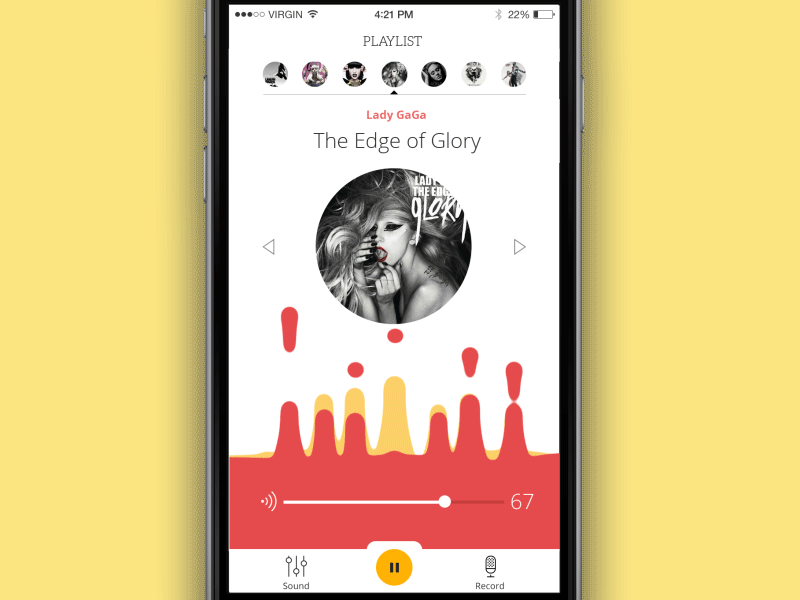
3. Support a simple and original idea that unites people
There are a lot of practical examples of how simple ideas based on some widespread needs, wishes, or hobbies rocketed to success. Take Instagram, which started as a simple service of sharing photos for those who like this type of presenting themselves, or Pinterest, which started as simple storage for interesting links. Now they are large-scale multipurpose services not only for personal but also for business needs, but they started from very basic needs which a lot of users could not satisfy in a fast and easy way. It is vital just to find the problem which makes a lot of people suffer, and they will unite around its solution.
4. Create a unique solution to the wide-spread problem or issue
There are two effective ways to make your product fast promoted, but they are first of all based on your decision if you are aiming at long-term or short-term perspective. If you want to create a long-term product that is going to become viral, then your way is to think on the problem globally and create the original product to solve the widespread problem. It will take more time and effort, but it also creates a long-term prospective way. On the other hand, if you want something that will make your name with less effort and quicker spread, there is one more way: you can find drawbacks and bugs in existing popular products and create solutions for them. This is usually the short-term perspective, but it can be helpful to get well-known on the basis of already promoted products.
In both cases, it is important to concentrate on originality, not copying. Don’t try to create a second Facebook. Try to find the first your own product or at least a feature that solves a problem that earlier couldn’t be solved or can make previous solutions better, faster, or easier, and people will do the promotion for you.
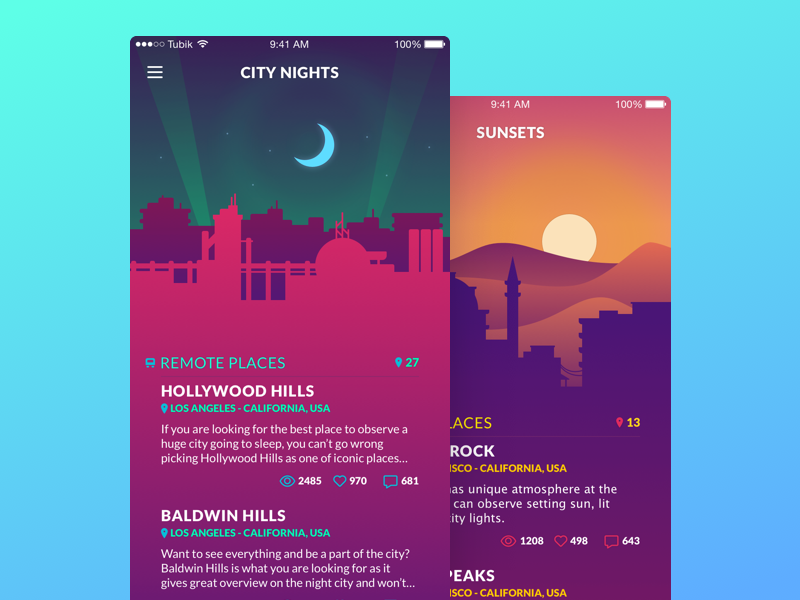
Skydeck app concept
5. Think over the element of fun and entertainment
People love when they are offered not only deeply serious things but also the element of the game or fun. Even highly scientific or business-like products can contain some elements of fun, which will make the product more widely discussed.
6. Create the need to involve friends in achieving user’s own goals
This is one of the most efficient techniques, which approved itself in numerous cases. When you create a great product, its quality can make people talk about it, and it will attract some attention. But if you promise the person something useful and beneficial, they start acting to satisfy their needs and, at the same time, attract new people to use your product directly. It can be more space in virtual storage, some exclusive bonuses in the games, or discounts on the goods – anyway, it will make users work as your most powerful weapon of product promotion.
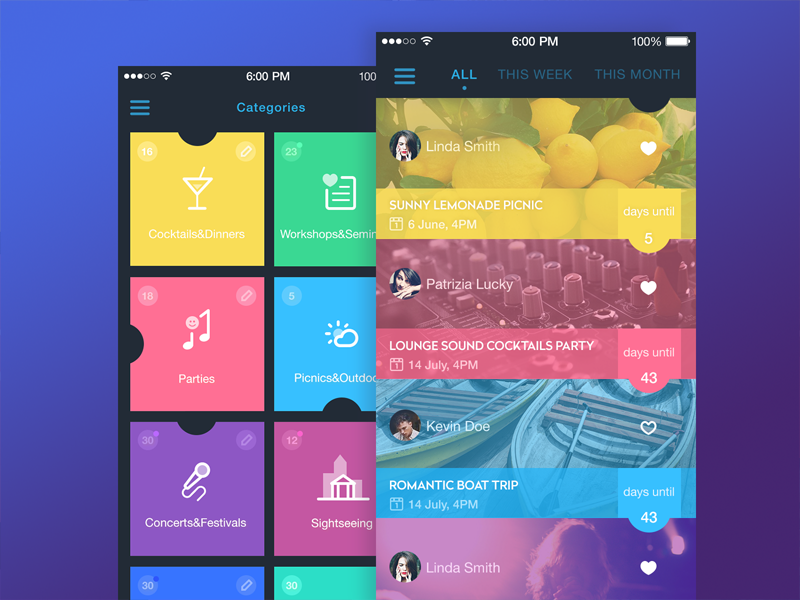
Event app concept
All the mentioned points would better be decided and agreed upon before you actually start the process of UX/UI design so that in this stage, you could polish your strategy by tactic steps.
UX design stage
In the process of UX design for the potentially viral product, your main aim is to create as positive a user experience as possible. Actually, it is required for any UX, but for the viral one, it’s vital. And you can make it with the following steps.
1. Create the illusion of the choice
Users don’t really like when they feel that they are forced to do something. To make the experience pleasant, you should think about how to create the illusion of choice, sometimes even in obvious things. Users should be guided invisibly through the thought-out navigation and layout, but at the same time, they should feel that they are real decision-makers at any step of the way. The absence of this feature can be dangerous for the virality of your product.
2. Think about the feeling of the game
Games can be different, and they are not only for kids. Sure, the more serious the product is, the more hidden the element of gamification will be. It is up to you, what part of your product will be infected with the direct or indirect gaming virus, but if you think about this sophisticated thing, it will work for you in spreading the product.
3. Give the product heart and soul
We can often hear that designers should put a part of their soul into the projects they are working on. And that is not a joke, especially when it comes to potentially viral products. When the designer gets deep into the task and tries to solve it as if it was their own problem, when designers look into the user’s problem and penetrate it, it always gives products of high-quality, user-friendly, and pleasant UX. Users don’t only use the product, but also feel the product, its temper, and its energy. And when the designer creates it cordially, not only mechanically, the user will feel and appreciate it.
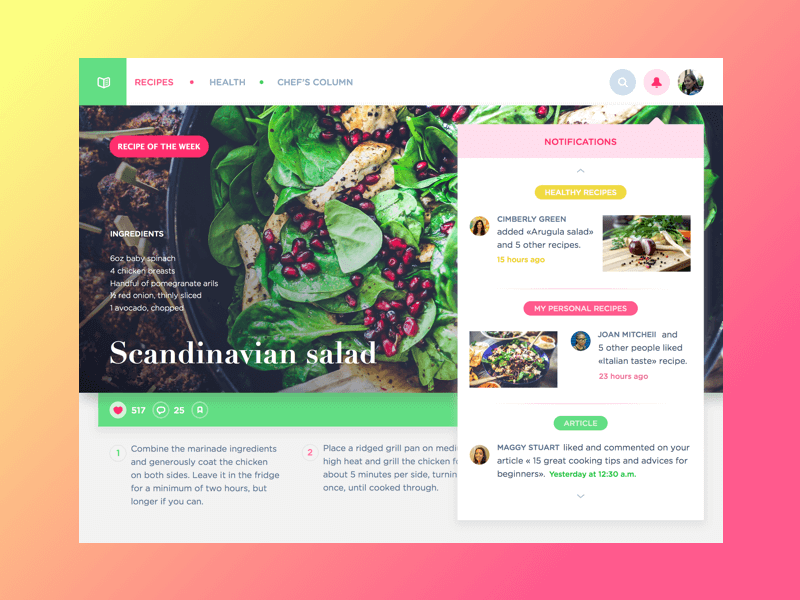
Recipe app concept
4. Provide necessary functions right when they are needed
This may be the main point to consider at the UX stage of the process. It is essential to analyze not only the whole concept of the product but also all the steps that users are going to do. This is the time when user stories and cases are going to be extremely helpful. When you think over them, you will be able to bring forward the features at that very moment when they are most needed. And it will inevitably create a positive experience that deserves to be shared with other users through positive recommendations.
5. Make the connection with social networks fast, easy, and solid
Social networks are the great basis for the virality of a product, so it’s vital to think if they are going to deal with it and how. You can (and should, if possible) simplify the sign-up and log-in procedures with social networks; you can think about how to encourage people to share their achievements or inform their friends and followers about using your product. It will create a strong and varied web presence and will open the door to the viral promotion of the product.
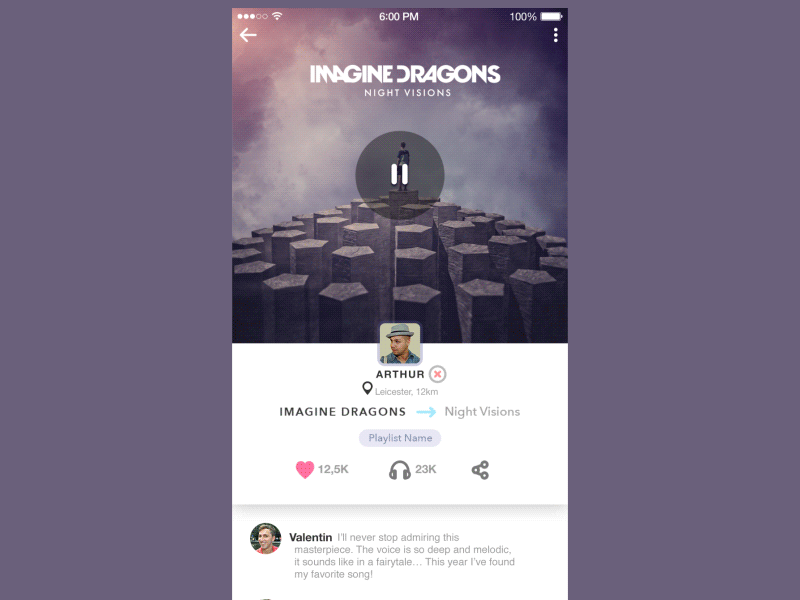
Echo project
UI design stage
The UI stage is more about the visual representation of the web or app product, so it’s easy to think that there’s nothing to do here because the most important basics of virality must have already been completed at the UX stage. However, there are a lot of important points which can expand and enforce the virality of the product at this stage. And we see them as the following:
- Make the product stylish and good-looking
- Ensure the interface is not overloaded
- Review and iterate to obtain the most efficient solutions
- Prefer UI elements that are simple, clear, and original
- Create unique and recognizable visual features (including icons, mascots, characters, and so on)
- Include interesting animation and transitions
- Provide an intuitive interface and natural interaction
- Include high-quality graphic elements
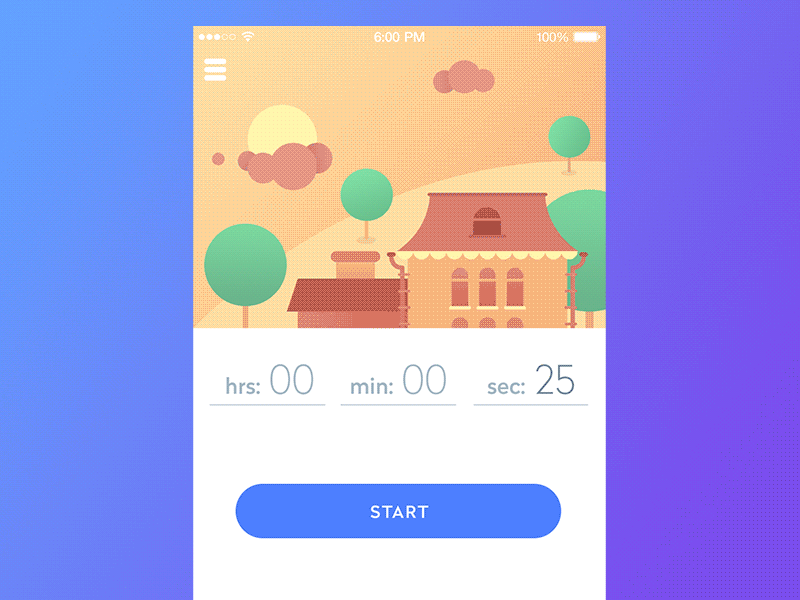
Bright interface animations

Fresh and funny button animation
At this stage, it’s very important to think of high-quality graphic elements, including the smallest ones. Depending on the nature of the product and target audience, you may use interesting illustrations, nice photos, funny characters, and the like to make the website or application visually appealing so much that people will be keen to show this “So nice! So cute! So stylish! So beautiful” something to their friends or colleagues. A traditional exchange like: “Have you seen that funny cat in the new calculator on PlayMarket? No? Still no? I can’t believe it, it’s so cute!” is able to virally promote the product even when it has no incredibly unique solutions to global problems.
Potential trap: utility vs good looks
When you consider how to make the product viral right from the first steps of creating and designing its concept, it’s easy to get into two well-known traps. One of them is to think that virality is the feature of only useful products, i.e., visual representation doesn’t matter. The opposite side of this fight says that only visual features really matter when you want to make your product viral. As you can assume from everything mentioned above, we would recommend keeping the balance and finding a happy medium. That is why it is important to think out and include different tactics at all stages of the design process. That doesn’t mean you have to apply all the positions mentioned above in one particular design process, as the choice of techniques depends deeply on the nature of the product and the target audience. However, thinking over all of the positions and applying those which are appropriate will bring massive results in the aspect of virality. As practice shows, only in this case will your product get truly viral through utility, usability, and pleasant looks. All of these features will bring out desirability, which is so important to make people want to share the product with others and promote it this way.
Useful Articles
Here’s a bunch of articles to dive deeper into the theme of usability and user experience design.
User Experience Design: 7 Vital User Abilities
UX Design: Types of Interactive Content Amplifying Engagement
Negative Space in Design: Tips and Best Practices
5 Basic Types of Images for Web Content
Motion in UX Design: 6 Effective Types of Web Animation
Types of Contrast in User Interface Design
5 Pillars of Effective Landing Page Design
How to Make Web Interface Scannable
The Anatomy of a Web Page: Basic Elements
Error Screens and Messages: UX Design Practices



